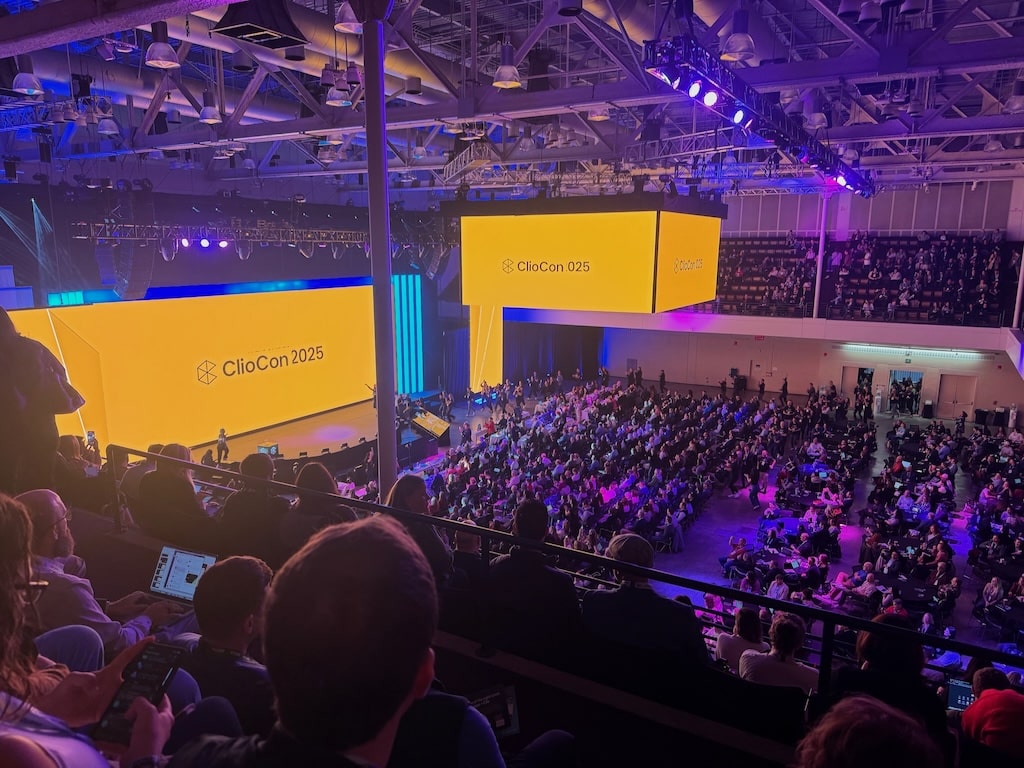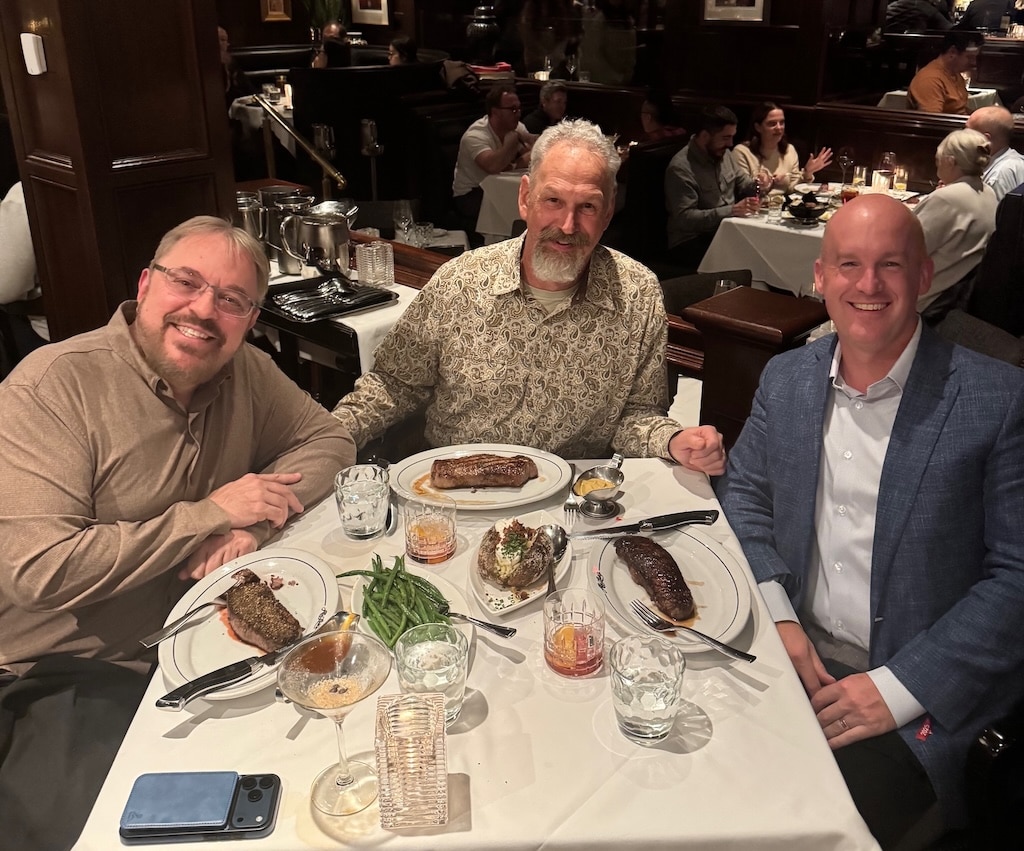Menu
Thoughts on ClioCon 2025
November 19th, 2025
Contributor: Brendan Chard
 A few weeks ago, I attended ClioCon 2025 in Boston as a channel partner and one thing was made abundantly clear: AI is here, there, and everywhere. From Clio’s own product innovations, to the vendor halls, to the educational tracks, AI is having more than a moment. And, it’s causing most folks who are paying attention to rethink everything. In this piece I’m going to touch on what I think this means for our attorney clients. But first, an additional observation.
A few weeks ago, I attended ClioCon 2025 in Boston as a channel partner and one thing was made abundantly clear: AI is here, there, and everywhere. From Clio’s own product innovations, to the vendor halls, to the educational tracks, AI is having more than a moment. And, it’s causing most folks who are paying attention to rethink everything. In this piece I’m going to touch on what I think this means for our attorney clients. But first, an additional observation.
Clio Goes Big Law
ClioCon is an interesting conference because the attendees are there to improve how their law firms operate. This means it’s an entirely different energy from your traditional CLE or substantive law focused conference. Rooms are filled with eager, entrepreneurial minded attorneys, mostly from small firms, that want to make their business run better.
The attendee energy will be interesting to observe in the coming years at ClioCon because about the only non-AI announcement out of Clio was that they are entering the big law market with “Clio for Enterprise.” You could have heard a pin drop in the conference center during this part of the opening keynote. For a company that was built entirely around smaller firms and supporting vendors, telling 2000 of them that you’re now catering to the big law firms they’ve eschewed landed with a thud. And it left me with many questions about the future of the company and its popular conference. Will the same energy and focus go into the main Clio product? Will ClioCon now have big law in attendance? Will there be ClioCon for Enterprise? Will small firms start to feel less important to Clio?
The announcement about Clio for Enterprise only represented about five minutes of content over the two days. And it was billed as a “net new investment” that won’t take anything away from Clio as we know it. Despite this, the downward shift in energy from the crowd has stuck with me. Perhaps it’s because we’ve struggled with that same decision over the years. We’re obviously on a miniscule scale compared to a company like Clio, but I’d like to think we, and Clio, have something special going with our commitment to smaller firms. And, so, I hope they figure out how to bring that same magic to their enterprise clients without taking away from the small law firms that have got them here.
Clio Acquires vLex
Ok, back to all the AI goodies. The biggest announcement out of ClioCon, in my opinion, was Clio’s acquisition of vLex for nearly $1 billion. VLex is the world’s largest legal research database covering over 100 countries and their AI is called Vincent. This will now be available (for a fee) directly within the Clio product and is a competitor to systems available from Thomson Reuters and LexisNexis. This is all pending regulatory approval which is expected later this year.
The idea behind this acquisition is that now Clio can help with every aspect of the journey for a law firm client. From initial intake in Clio Grow all the way through the handling of their matter. Clio, with the help of their AI capabilities, can be contextually aware of what’s happening in the firm and assist with emails, calls, appointments, discovery, strategy, research, drafting and more. All trained on reliable legal data from vLex, not Reddit, like ChatGPT.
Given the direction knowledge work is going with the explosion of AI tools, this is an acquisition that Clio had to make. Thomson Reuters and LexisNexis (now RELX Group) have pretty much gobbled up everyone else so, if Clio wants to be the software that can do it all for lawyers, vLex and Vincent fill a large gap in their product offering. Now you can run your practice and do a big chunk of your client work in one place.
AI To Make You a SuperLawyer
The primary promise from the current generation of AI tools now available to lawyers is that they can supercharge you and your practice. You can be faster, do better research, be more strategic, handle more legal work and cut time spent on administration. A key takeaway from the conference regarding these tools is that it will become the expectation that lawyers leverage these tools. Just like how we expect and accept that carpenters use power tools, accountants use computers and surgeons use robotics. This shift in client expectations will happen for a few reasons.
Do More In Less Time
The ability of AI tools to churn through data is unprecedented; they can level the playing field for small firms going against big opponents. Receiving hundreds or thousands of documents to review no longer requires a small firm to automatically staff up. Research can be done dramatically faster. Beyond the legal work, the business side of a firm can now utilize AI enhanced services for incoming phone calls, live chat, billing, scheduling, email updates and more.
Improved Work Quality
Another key driver for using AI in law practice will be the improved quality of work. Yes, there have been headlines about AI making up citations that don’t exist, but the quality of the software is only going in one direction, and these big mistakes happen when lawyers are being lazy and asking AI to do their work instead of having AI help to make their work better. Lawyers can now converse with systems that have almost the entire body of legal knowledge available to reference. AI can be used to interrogate your work, your strategy, your arguments, your writing and in seconds, make it better by surfacing an impactful case, strategic angle or phrase not previously considered. Even though you may find that 8 of the 10 suggestions an AI offers are off the mark, the two that are on point make your work stronger than it was seconds earlier. This will give a competitive edge and improve service.
New Business Models and Improved Access
Unlike the medical profession, which has developed a vast availability of para-professionals to improve access to care, lawyers remain gated. There is no nurse practitioner or physician’s assistant equivalent in law. So, as our society’s legal needs have grown in quantity and sophistication, availability of legal services have not kept up across all income levels.
AI tools show great promise to bring costs down and improve access to legal help. Thompson Reuters donated their CoCounsel software to The Innocence Center, tripling their filings and cutting some process times by 95%. Many court systems and public offices now using AI tools are seeing significant increases in efficiency.
Increases in efficiency will impact the market and put pressure on “business as usual.” It could allow lawyers to take on more clients. It may push prices down. No longer will it be acceptable to bill for 5 hours of work on a menial task that AI can complete in 15 minutes. We’ll likely see new law firm business models such as the FAIR Practice Model by Access Legal that leverage these tools to deliver service and billing in entirely new ways. This can unlock opportunities to serve populations whose needs aren’t currently met while changing the overall business landscape at the same time.
Steps Lawyers Should Take Regarding AI
If there’s one common feeling amongst lawyers right now it’s that AI is making heads spin and it feels like big change is coming. Here is some easy advice on how to get your feet wet with AI and get your creative gears turning.
Keep Experimenting
One of the best conversations I had at ClioCon was with a client, Kuhn Rogers, a broad general practice law firm in Traverse City, Michigan, and a few other attendees over a lunch table. Marc, our client, was talking about how these AI tools are leveling the playing field against larger firms and the conversation meandered into what big law is doing with AI. Another person at the table said his daughter was at a large firm and they had a mandate to experiment with AI tools, every day, for at least 15 minutes. This simple practice had led to enormous productivity gains and innovations being shared throughout the firm.
Giving yourself a “15 minutes to experiment” mandate is something we all can do. Don’t be afraid, pick a task and experiment. Have it draft an email, critique your writing, do some basic research. And don’t stop at one prompt, the magic often happens when you press harder and give more context or give the AI a job description or role to play. Demand citations and sources for its answers. Make sure it understands your locale and jurisdiction. Clio has published two resources to help lawyers get started. One is on prompts lawyers can use with ChatGPT. A second is a CustomGPT for lawyers created by Clio that has more specific instructions and guardrails for legal work..
If you’re not comfortable with AI for work just yet, try with your personal life. Make a meal plan from what’s in your fridge, make a reading list based on your interests, learn why all the kids say 6-7, or draft a dream vacation itinerary. Just start getting comfortable messing around with it.
Privacy Considerations
Amongst the general AI chat tools like ChatGPT, Gemini, CoPilot and Claude, especially the free versions, there are serious confidentiality issues. In general, conversations can be accessed by the companies for research and training, be subpoenaed, and are not HIPAA compliant. Be sure to anonymize all conversations. As you move into paid versions, or legal specific tools such as CoCounsel, Clio Vincent, Eve, Spellbook, Lawpro.ai, privacy and legal protections increase to satisfactory levels.
Try Specialty Tools
For any part of your practice that is routine, repetitive, annoying or a time-suck, there probably is an AI enhanced solution. Perhaps within software you’re already using. Explore these. Schedule an interactive demo with the vendor. Try stuff out.
Keep Coming Back
The pace of improvement for AI tools is astounding. If it’s not meeting a need now, keep coming back to it. Mistakes will continue to diminish. Specialized knowledge will keep growing. Speed will improve. Capabilities will expand. According to Richard Susskind, keynote speaker at ClioCon and a leading thinker on the impact of AI on the legal profession, we are just at the foothills of AI with no end in sight. So don’t write anything off permanently if it’s not where you need it to be yet, keep checking.
Thank You
I want to close this post with a shout-out and special “thank you” to clients Geoff and Hadrian over at The Modern Family Law Firm. Geoff and his partners truly live up to their “modern” name by utilizing tech and processes that keep them at the leading edge. He had been pushing me to attend ClioCon for a few years and I finally had to tell him he was right. ClioCon is a terrifically well run conference with a production value that’s off the charts. It’s always so nice to see clients in person and share ideas and stories over good food and drink. So, thank you Geoff and Hadrian.





